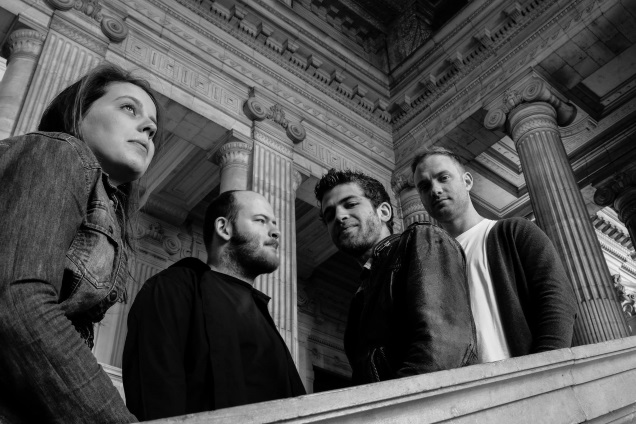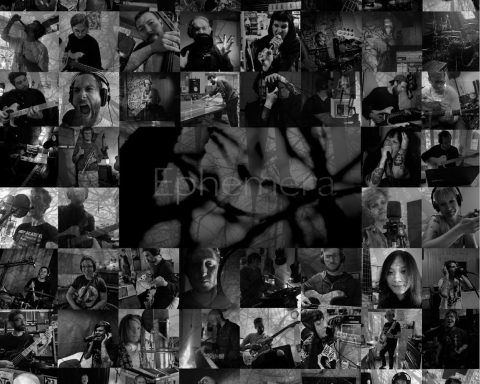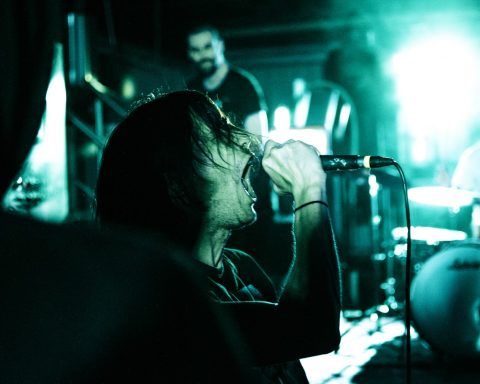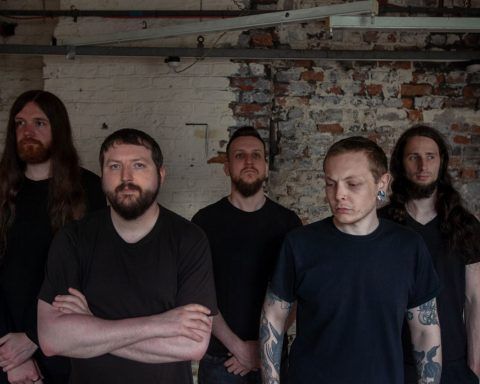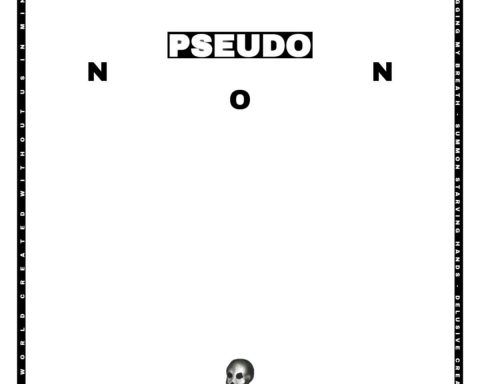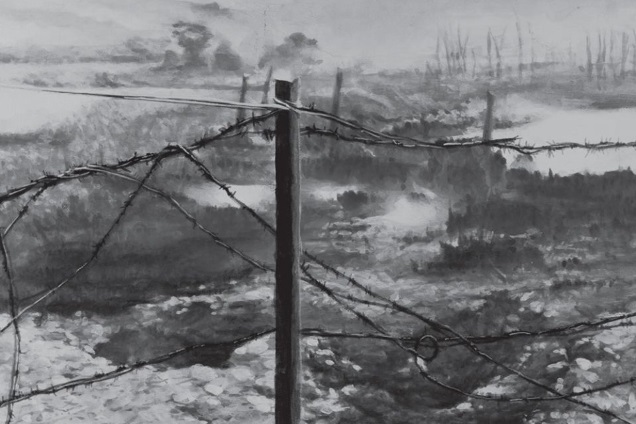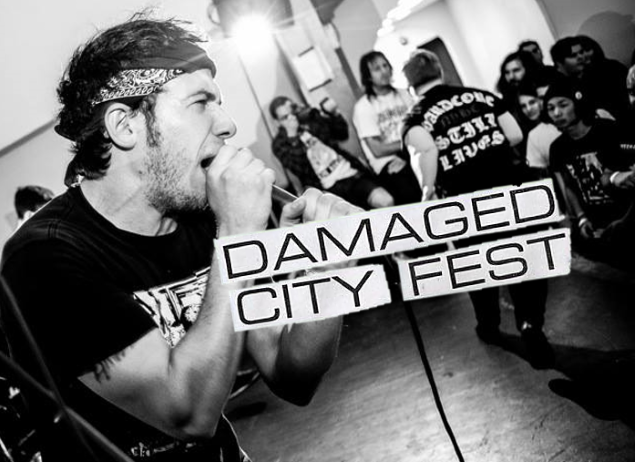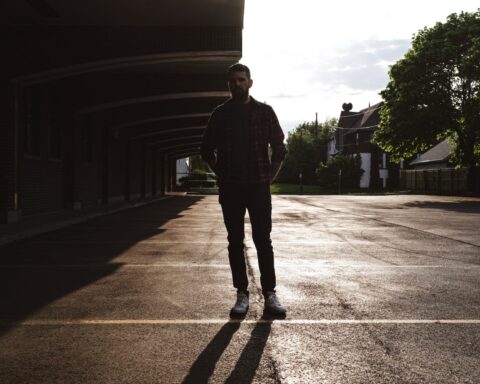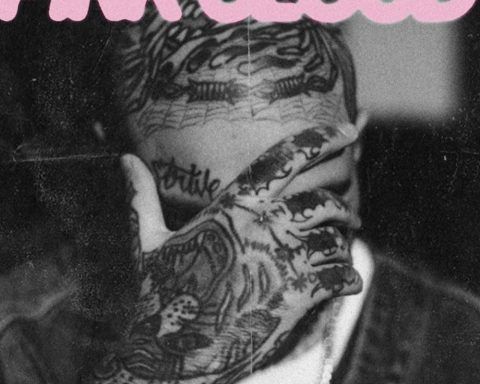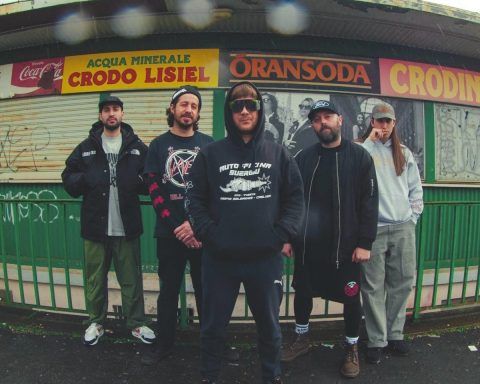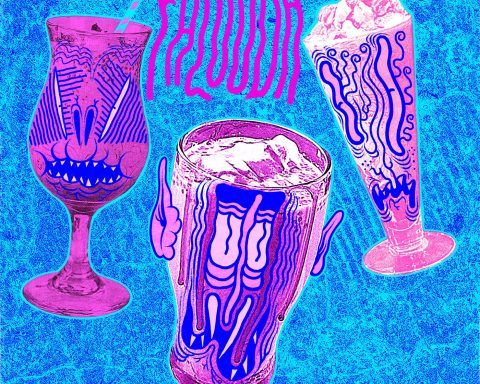Soon after the release of their second album USSR 1926 (a soundtrack to the silent movie A Sixth Part of the World by Dziga Vertov, 1926) in Fall 2015 via DIY label Kapitän Platte (EF, IMMANU EL), live post rock artists WE STOOD LIKE KINGS have teamed up with IDIOTEQ to introduce their project, tell about their love for silent films and instrumental rock music and explain the art of mixing soft, epic, intense and refined soundscapes with old movies, leading to intriguing experience and staggeringly beautiful moving scenes. Read the full interview with pianist Judith Hoorens below.
WE STOOD LIKE KINGS has composed BERLIN 1927, a soundtrack to Walther Ruttmann’s Die Sinfonie der Großstadt, which was released in 2014 on Kapitän Platte and programmed in already more than seventy cinema halls and rock venues across Europe. In 2015, the band has presented a new project, USSR 1926, a soundtrack to Dziga Vertov’s A Sixth Part of the World.
Photo by Esther Tchogninou.
Hey there Judith! Thanks so much for taking some time with us! How are you doing this fine Winter?
First of all, thank you for your interest in our music and for this interview.
The winter (if we can call it a winter… we got incredibly hot weather until now here in Brussels) has been really busy until now, we just released our second album, toured a lot and now we’re planning our 2016 live shows. We’ll also start working soon on our third album which will be another silent movie project. We feel excited !
We’ll definitely dive into the details of that, but please allow us to go back to the very beginning of your story. How and when did you get involved in a band and became musicians? Please tell us a bit about your background.
We each have a different story, some of have started playing music very early, some picked up an instrument a bit later. Personally, I started learning classical piano at a young age, then decided to study music writing at university, which helped me better understand how music functions. I always had an interest in non-classical stuff, so I got involved in a pop band at boarding school (which is also where I met Mathieu, our drummer). Then I discovered post-rock through a friend of mine and I knew right away that this was the genre I wanted to play myself. Later on I started a first post-rock project, which then evolved into WE STOOD LIKE KINGS.
I guess what unites the four of us as a band is the fact that we define our music as something that should provoke an emotional response, both for us and for the audience. What I love about being in a band is that it feels a bit like family. You’re working on big projects together and share so much time, on the road, on stage, in the studio, during rehearsals…
How did you first get into silent film accompaniment?
Since we started out as a band, we always had the feeling that our music would fit very well with visuals, though we didn’t have a concrete idea of what we wanted to do. Then, a few months after our first concerts, someone came to us and said we should write new music for Berlin : Die Sinfonie der Großstadt, a silent movie made by Walther Ruttmann in 1927. That was our first encounter with silent cinema and since that day, we completed two soundtracks projects : BERLIN 1927 and USSR 1926, which is a soundtrack for A Sixth Part of the World (Dziga Vertov, 1926). Both were released on CD and vinyl by the German label Kapitän Platte. Today, we are thinking about our third project which we will start working on in a few weeks. We still have to decide which direction we will choose, so that’s very exciting.
Do you think of yourself more as a post rock or a classical troupe of musicians?
We think of ourselves definitely as a (post-rock) band. Not especially wanting to limit ourselves to the “post-rock” genre (which is impossible to define anyway). But of course we are a band, we just happen to have this special concept where we play live to silent movies.
It’s true that there are quite a few classical influences in our music, probably due to the fact that I have been studying classical music for many years, and it influences my piano playing, that’s for sure.
Would you mind giving some insight into your creative process?
As we work with visuals – silent movies -, this has an impact on the way we create music. We have to take the structure of the movie into account and decide how to split it into different parts, how to interpret the emotions transmitted by the images.
At rehearsals, we always project the movie (we have an old screen that’s almost as old as the movie :p). We usually start from ideas which can be brought in be any member of the band, then jam around those while watching. At some point, we feel like “this is working”. Some parts are easy, some are much more difficult. It’s all about finding the balance between the energy of the music and that of the movie.
I would say, we start with the more “inspired” part of the music, let ourselves dive into the music, after which we follow a more rational approach to put all the pieces of the puzzle together.
You’ve recently released a soundtrack to the silent movie A Sixth Part of the World by Dziga Vertov (1926). Tell us about the initial idea of picking this particular picture. How did you realize it’s the right choice for your second record?
We knew about Vertov from his famous movie “The Man With A Movie Camera”, which is very similar to Ruttmann’s movie “Berlin”.
However, we didn’t want to choose it because it was so famous that a lot of musicians have already written new soundtracks for it. Also it’s been played in cinema’s a lot. We thought it would be a more interesting idea to pick a lesser known movie, and then we found “A Sixth Part of the World” which we liked a lot, mostly because of the very emotional images and the amazing montage. Some shots are also really impressive and make us wonder who they did it in those days, without all the technical facilities we have today.From a thematic point of view, it fitted well with BERLIN 1927 because it represents another “rise and fall” society on the edge of collapsing.
Compared to your first score, did you approach this project differently?
We worked more consciously on USSR 1926 thanks to the experience we had gathered with BERLIN 1927. We had a better idea of what we wanted to do. Musically speaking, we stayed in the same vein, but I would say we were more professional in our approach.
Are there any particular films that you’re very keen to try enhance with your music?
There a lot of movies that we find absolutely fascinating. The thing is, you can only do one at a time.
We just decided on our next move (unless we change our minds) : we will do a leap in time and write a new soundtrack for the 1982 “silent” movie about Western civilisation, Koyaanisqatsi. We will have to do our very best, because the original music was written by Philip Glass.We had several films on our wish list, but this one seems to be the most inspiring for us to work on now.
Ok Judith, so you’re about to hit European roads very soon. How has touring influenced your songwriting or the band in general?
Touring is important in two ways. First, it allows us as a band to really become close to each other, because we spend so much time together. That’s a good thing because, when we’re back in the rehearsal room, we can feel that touring has strengthened our bonds. Of course, besides the fun, there are less enjoyable things to be taken care of, so it’s also very revealing of each other’s personality. Second, it’s a way of testing your music and how the audience reacts to it. As you’re on stage every night, you can really compare much better why this or that worked in such or such venue. Also, meeting the audience after the concerts is always helpful, it helps us understand and define what people like about our music, how it makes them feel. And in the end, we feel like being on the road and discovering countries thanks to music is just the most amazing thing that’s ever happened to us.
How much improvisation is involved when you perform live?
Though everything is pretty much fixed in advanced (this is needed to ensure synchronisation with the movie), we allow ourselves some freedom in several parts, where each of us may add some little nuances or extra details on the spur of the moment.
How do you remember your first show in Poland at last year’s Asymmetry Festival?
We have very good memories of it. I remember we drove all the way to Poland from Brussels in one day, arrived in Wroclaw far into the night, slept a short night and had to soundcheck early in the morning. Then we had some time to hang around in the city and see the other bands, which was very nice. We started playing at about 1AM and I liked the fact that everybody started to sit down in the venue, it was a very nice, relaxed atmosphere to close the festival’s day.
What other post metal and experimental music festivals would you recommend to check out this year?
I would recommend (in chronological order) the Dunk!festival here in Belgium (which has become a reference in Europe), A Colossal Weekend in Copenhagen, then the Vivid. Festival at the end of September in Norway, which experiments with new ways of involving audience and audiovisual expressions.
Ok Judith, lastly, would you recommend some other musicians that do an excellent job of scoring for old silent movies?
I had been keeping a list of other “silent movie musicians” which I came across the internet, but unfortunately, my old computer broke down so I lost it. One of the greatest performances I have seen live is both of the famous movie “Nosferatu”. One was by the experimental band EXPULSION PROPELLER and the other one by DJ Penelope. Bands I remember from the list are for instance 3EPKANO, ZENZILE, YEAR OF NO LIGHT…
Thanks so much for your time! Feel free to add your final words and take care!
Thanks for the interview! If you’re interested in getting to know us more, check this out and of course, follow us on Facebook.

WE STOOD LIKE KINGS official website
WE STOOD LIKE KINGS Facebook
WE STOOD LIKE KINGS Twitter
WE STOOD LIKE KINGS Vimeo
WE STOOD LIKE KINGS Bandcamp
WE STOOD LIKE KINGS YouTube
WE STOOD LIKE KINGS Facebook
WE STOOD LIKE KINGS Twitter
WE STOOD LIKE KINGS Vimeo
WE STOOD LIKE KINGS Bandcamp
WE STOOD LIKE KINGS YouTube



